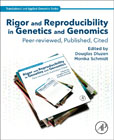
Rigor and Reproducibility in Genetics and Genomics: Peer-reviewed, Published, Cited
Patrinos, George P.
Dluzen, Douglas F.
Schmidt, Monika
Rigor and Reproducibility in Genetics and Genomics: Peer-reviewed, Published, Cited provides a full methodological and statistical overview for researchers, clinicians, students, and post-doctoral fellows conducting genetic and genomic research. Here, active geneticists, clinicians, and bioinformaticists offer practical solutions for a variety of challenges associated with several modern approaches in genetics and genomics, including genotyping, gene expression analysis, epigenetic analysis, GWAS, EWAS, genomic sequencing, and gene editing. Emphasis is placed on rigor and reproducibility throughout, with each section containing laboratory case-studies and classroom activities covering step-by-step protocols, best practices, and common pitfalls. Specific genetic and genomic technologies discussed include microarray analysis, DNA-seq, RNA-seq, Chip-Seq, methyl-seq, CRISPR gene editing, and CRISPR-based genetic analysis. Training exercises, supporting data, and in-depth discussions of rigor, reproducibility, and ethics in research together deliver a solid foundation in research standards for the next generation of genetic and genomic scientists. Provides practical approaches and step-by-step protocols to strengthen genetic and genomic research conducted in the lab or classroomThrough illustrative case studies and training exercises, discusses common pitfalls and solutions for genotyping, gene expression analysis, epigenetic analysis, GWAS, EWAS, genomic sequencing, and gene editing, among other genetic and genomic approachesSpecifically examines best practices for microarray analysis, DNA-seq, RNA-seq, gene expression validation, Chip-Seq, methyl-seq, CRISPR gene editing, and CRISPR-based genetic analysis INDICE: Section 1: Introduction 1. Review of reproducibility in genetic studies (John Ioannidis, PhD) 2. Review of common statistical practices and assumptions (Daniel Benjamin, PhD) 3. Rigor in the classroom and in the mentor/mentee relationship (Douglas F. Dluzen, PhD) Section 2: Genotyping 4. Review of GWAS studies (Naomi Wray, PhD) 5. Best practices in GWAS and pitfalls to avoid (Daniel Benjamin, PhD) 6. GWAS learning and training activities (Bethany Bowling, PhD, Northern Kentucky University) 7. DNA sequencing for genotyping and best practices for comparative genomics (Heidi Rehm, PhD) 8. Statistical approaches for rigorous genome sequence analyses and genotype imputations (Nianjun Liu, PhD, Indiana University) 9. DNA sequencing activities; classroom case studies (Rivka Glaser, PhD, Stevenson University) Section 3: Gene Expression 10. Review of gene expression using microarray and RNA-seq (Alexandra Soboleva) 11. Best statistical approaches for analysis of gene expression data (Purvesh Katri, PhD) 12. Validating approaches to gene expression studies (Yaov Benjamin, PhD) 13. Misconceptions in the classroom and case studies (Dina Newman, PhD) Section 4: Epigenetic Analyses 14. Review of DNA methylation and other omits data resources (Thomas Jenuwein) 15. Statistical approaches to improve rigor in Chip-Seq, methyl-seq, and epi datasets (Olga Troyanskaya, PhD) 16. Best methods for combining DNA, RNA, and methylation data (Jennie Williams, PhD) 17. Teaching epigenetics in the classroom (Louisa Stark, PhD) Section 5: Gene Editing Technologies 18. Review of current gene editing technologies, including CRISPR (Lei Stanley Qi, PhD) 19. Best strategies to design and implement CRISPR-based genetic analysis (Kathy Niakan, Phd) 20. CRISPR classroom activities and/or case studies (Sylvain Moineau, PhD) Section 6: Conclusion Appendix: Links to supplementary resources
- ISBN: 978-0-12-817218-6
- Editorial: Academic Press
- Encuadernacion: Rústica
- Páginas: 472
- Fecha Publicación: 01/07/2021
- Nº Volúmenes: 1
- Idioma: Inglés
- Inicio /
- /
